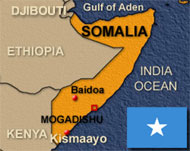UN expert: Somalis are victims of the "most terrible" rights abuses
 Geneva - Somalia is the scene of one of the worst humanitarian crises in the world and its citizens have been victims "of most terrible human rights and humanitarian law abuses," the United Nations expert on the east African country said Wednesday.
Geneva - Somalia is the scene of one of the worst humanitarian crises in the world and its citizens have been victims "of most terrible human rights and humanitarian law abuses," the United Nations expert on the east African country said Wednesday.
Shamsul Bari, addressing the Human Rights Council in Geneva, said a third of the 9 million Somalis have become refugees and 1 million have been internally displaced due to the almost unabated violence that has plagued their country in the past two decades.
"Those who cannot afford to leave, suffer one of the most precarious existences I have witnessed in my many years of work," said Bari, adding that Somalis "have to live in constant fear for their lives."
The UN refugee agency reported this week that the number of Somalis seeking asylum in 2008 rose by 77 per cent over the previous year. Many have taken a dangerous journey by sea, in unsafe and overcrowded boats, to Yemen.
He said children had barely a hope of getting any formal education, food was scarce, international aid was subject to pilferage and medical services were out of reach for many.
"On top of this, there are unscrupulous traders who exploit the plight of the people for personal gain," Bari said, calling Somalia the world's forgotten crisis.
He noted also the abduction and killing of human rights activists, aid workers and journalists.
There was, however, "a new momentum" for "lasting peace and security" in what many consider to be the world's most fragile nation, Bari said, with the recent peace deal hammered out in Djibouti and the withdrawal of Ethiopian troops.
"Ethiopia's withdrawal deprives the militant Islamist liberationists of their national appeal," said Bari, referring to groups who have gain power and influence in the past few years, particularly since the foreign troops entered Somalia.
Ethiopia said in response that its troops did not violate human rights and it stood behind the invasion.
Earlier this year, a vote was held within an extended transitional parliament and a former opposition leader from the Islamists was appointed president of Somalia.
Bari stressed that the ability to capitalize on the window of opportunity would depend in a large part on the international community's commitment to Somalia, including sending peacekeeping forces and strengthening the government and national institutions.
Human rights, he said, should be integrated into the peace process and the institution building.
The special expert also suggested holding a conference to look into "harmonization" of Islamic law or sharia and human rights law. (dpa)